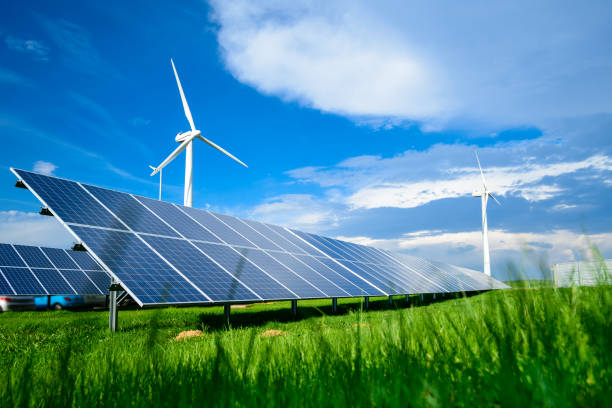The global energy market is undergoing a monumental transformation, and at the heart of this shift is renewable energy. Solar, wind, hydropower, geothermal, and other renewable sources are reshaping how we produce, consume, and think about energy. Driven by environmental concerns, technological advancements, and economic factors, the rise of renewable energy is not just about reducing carbon footprints—it’s about revolutionizing the entire energy landscape. In this article, we will explore 10 key ways renewable energy is revolutionizing the global energy market.
1. Decarbonizing Energy Production
One of the most profound impacts of renewable energy is its ability to decarbonize energy production. Fossil fuels such as coal, oil, and natural gas have been the dominant energy sources for centuries, contributing significantly to greenhouse gas emissions. Renewable energy sources like solar and wind power produce electricity without emitting carbon dioxide or other harmful pollutants. This shift is helping to reduce the global carbon footprint and combat climate change.
By reducing reliance on fossil fuels, renewable energy is a cornerstone in the transition to a low-carbon economy. Countries around the world are implementing ambitious goals to achieve net-zero emissions, with renewable energy playing a pivotal role.
2. Reducing Energy Costs for Consumers
As the cost of renewable energy technologies continues to decline, consumers are benefiting from lower electricity prices. Solar panels, wind turbines, and energy storage solutions have become more affordable over the past decade, making renewable energy a cost-effective option for both homeowners and businesses.
Energy providers such as Octopus Energy are offering competitive rates for clean energy plans. Through programs like the Octopus Energy referral, customers can switch to renewable energy providers while enjoying cost-saving incentives, further encouraging widespread adoption of renewables.
3. Increasing Energy Independence
Renewable energy sources, particularly solar and wind power, are widely available and accessible in many regions of the world. Countries that rely heavily on imported fossil fuels are turning to renewables to boost their energy independence. By investing in domestic renewable energy infrastructure, these nations are less vulnerable to geopolitical tensions, price fluctuations in oil and gas markets, and supply chain disruptions.
Renewable energy also allows individual consumers to generate their own power through rooftop solar panels or small-scale wind turbines, further enhancing energy independence at a local level.
4. Job Creation and Economic Growth
The renewable energy sector has become a significant driver of job creation and economic growth. According to the International Renewable Energy Agency (IRENA), the renewable energy industry employed over 12 million people worldwide in 2022, a number expected to grow as the sector continues to expand.
From manufacturing and installation to maintenance and research, renewable energy creates opportunities across a wide range of industries. As more countries invest in renewable energy infrastructure, they are fostering local economies and providing long-term job stability.
5. Driving Innovation and Technological Advancements
Renewable energy is at the forefront of technological innovation. Advancements in photovoltaic technology, wind turbine efficiency, and energy storage systems have significantly improved the viability of renewable energy. Innovations such as floating solar farms, offshore wind turbines, and next-generation battery storage are making renewable energy more efficient and reliable.
These technological advancements are not only reducing costs but also improving the scalability of renewable energy, making it a key component of the global energy mix.
6. Diversifying the Energy Mix
One of the most important ways renewable energy is transforming the global energy market is by diversifying the energy mix. In the past, many countries were heavily reliant on a limited number of energy sources, mainly fossil fuels. Today, renewables are providing a diverse range of energy options that are more resilient and adaptable to changing market conditions.
By incorporating solar, wind, hydropower, geothermal, and bioenergy into their energy portfolios, nations are reducing the risk of supply disruptions and price volatility while enhancing energy security.
7. Empowering Consumers with Clean Energy Choices
The rise of renewable energy is giving consumers more choices than ever before when it comes to their energy consumption. From residential solar installations to community wind farms, consumers can now opt for clean energy sources that align with their environmental values. Many energy providers, including Octopus Energy, offer customers the ability to choose 100% renewable energy plans.
Through referral programs like the Octopus Energy referral, consumers can not only reduce their environmental impact but also receive financial incentives for making the switch to green energy. These programs are making it easier and more affordable for people to access clean energy.
8. Reducing Water Usage
Conventional power plants, especially those that use coal and nuclear power, require vast amounts of water for cooling and operational purposes. In contrast, renewable energy sources such as wind and solar power require little to no water to generate electricity. This makes renewable energy more sustainable, especially in regions facing water scarcity.
By reducing the water footprint of energy production, renewable energy is helping to preserve vital water resources, which are under increasing pressure due to climate change and population growth.
9. Improving Grid Stability and Reliability
While renewable energy sources like solar and wind are often criticized for their intermittency, advancements in energy storage and smart grid technologies are addressing these concerns. Large-scale battery storage systems allow excess energy generated during sunny or windy periods to be stored and used when demand is high or when renewable energy production is low.
Moreover, decentralized renewable energy systems, such as rooftop solar panels, are contributing to a more resilient and stable grid by reducing the load on centralized power plants. This decentralized approach also provides backup power during outages or grid failures.
10. Promoting Sustainability and Environmental Stewardship
Perhaps the most significant way renewable energy is revolutionizing the global energy market is by promoting sustainability and environmental stewardship. The shift towards clean, renewable energy sources is crucial for protecting ecosystems, reducing air and water pollution, and mitigating the impacts of climate change.
Renewable energy represents a long-term solution to the world’s energy needs, offering a sustainable alternative to the finite and polluting resources of the past. As more businesses and individuals embrace renewable energy, the collective impact on the environment will be profound.




